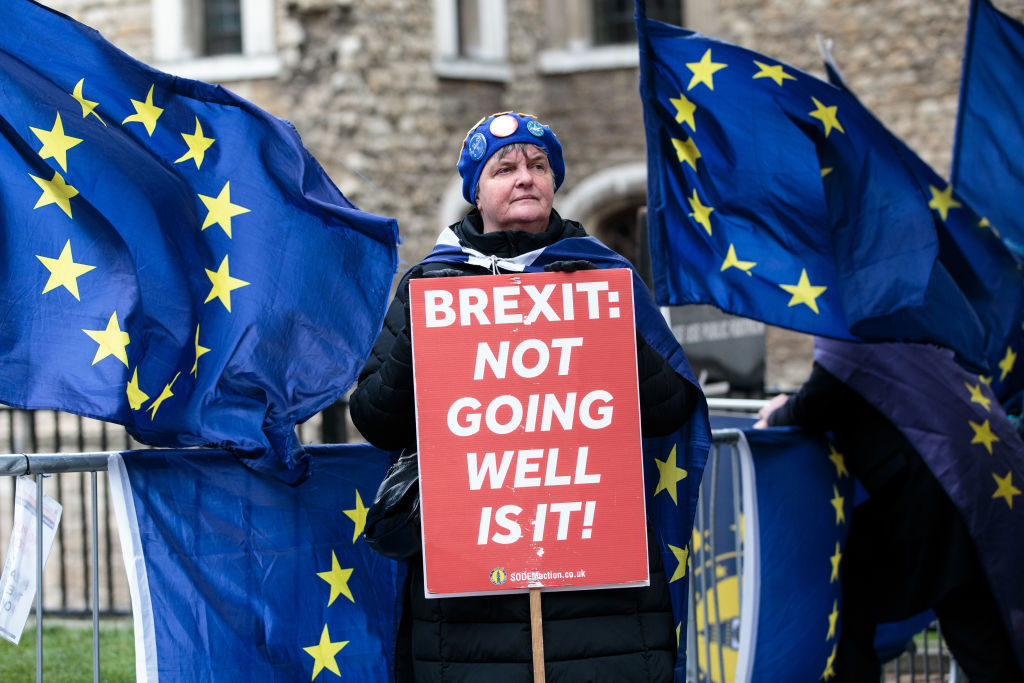As Americans will recall, escaping the arbitrary power of an empire can take years. Now imagine doing it with the French being actively obstructive, George Washington committed to paying the taxation and doing without the representation for a period to be determined by George III, and Washington, having lost the support of his closest advisors, now asking Lord North for help.
This is pretty much where Theresa May’s government finds itself after this week’s double defeat in the House of Commons. These are only the latest in an apparently endless sequence of humiliations. There are more to come, but no one knows where they will come from, or when. Frankly, it’s humiliating to have to explain how we got here from the 2016 referendum. But here we are.
It seemed like a good idea at the time. In June 2016, the British voted to leave the undemocratic and corrupt European Union. Given how the EU has gone since the Brexit referendum of 2016, it still seems like a good idea in theory. But the reality of Brexit has turned into such a nightmare that anyone who advocates for the theoretical advantages of Brexit sounds like the people who tell you that real socialism has never really been tried.
The problem is that the process can’t deliver the theory. It doesn’t help that Theresa May contrives to combine the qualities of rigidity and feebleness, or that she can talk out of both sides of her mouth without saying anything at all. It doesn’t help that she squandered the Conservatives’ majority in the 2017 elections, and that her minority government is a hostage of the Democratic Unionist Party of Northern Ireland. Nor has it helped that May has pursued the novel negotiating strategy of giving the EU almost everything it wants, and arriving at a deal so flawed that when she put it to the House of Commons in January, the margin of defeat, 432 votes to 202, was unprecedented in modern times.
The problem is deeper, and more serious. Brexit was meant to return sovereignty to the British parliament. But the parliamentary system is failing to turn theory into practice. After the referendum, the House of Commons voted to trigger Article 50, the article of EU law under which member states may initiate secession from the EU. That set a deadline of March 29, 2019. The terms of departure were ‘Deal’ or ‘No Deal’. The government committed to work for a deal. We are now just over two weeks from Brexit Day. On Tuesday, the Commons defeated May’s deal for the second time, by 149 votes. On Wednesday, the Commons expressed a clear preference for extending the negotiating period, in order to avoid a ‘No Deal’ Brexit at the end of March. Several of her cabinet ministers defied the whip and voted against the government.
We now have no deal, no ‘No Deal’, and no idea what will happen next. The collective responsibility of the cabinet, an essential cog in the machinery of government, has broken. The failure of the government is passing the buck to the Commons, but it’s not clear if the Commons can agree on what to do. Minister are believed to be working on their own plans, to be tested by ‘indicative’ votes which will indicate which, if any, plan might gather a majority.
James Forsyth, political editor of the UK Spectator, writes that the question now is ‘whether there is still time to avoid a meltdown of our political system’. It’s clear that if May requests an extension, the EU will have requests of its own, including some ideas for how she proposes to sell her duff deal for the third time. It’s not clear whether May will obtain an extension, or what she could use it for. Katy Balls, The Spectator’s political correspondent, hears that many MPs have lost confidence in May’s ability to govern, and want a general election. A majority of the public just wants the whole business to be over. But the government cannot do the business.
We have been here before, but only once. When Lord North accepted the outcome of the American Revolution and resigned, George III struggled to form an administration capable of controlling the Commons and negotiating the Treaty of Paris. He managed it in the end. Theresa May, however, is no longer able to organize even the terms of our surrender.
Dominic Green is Life & Arts Editor of Spectator USA.


















